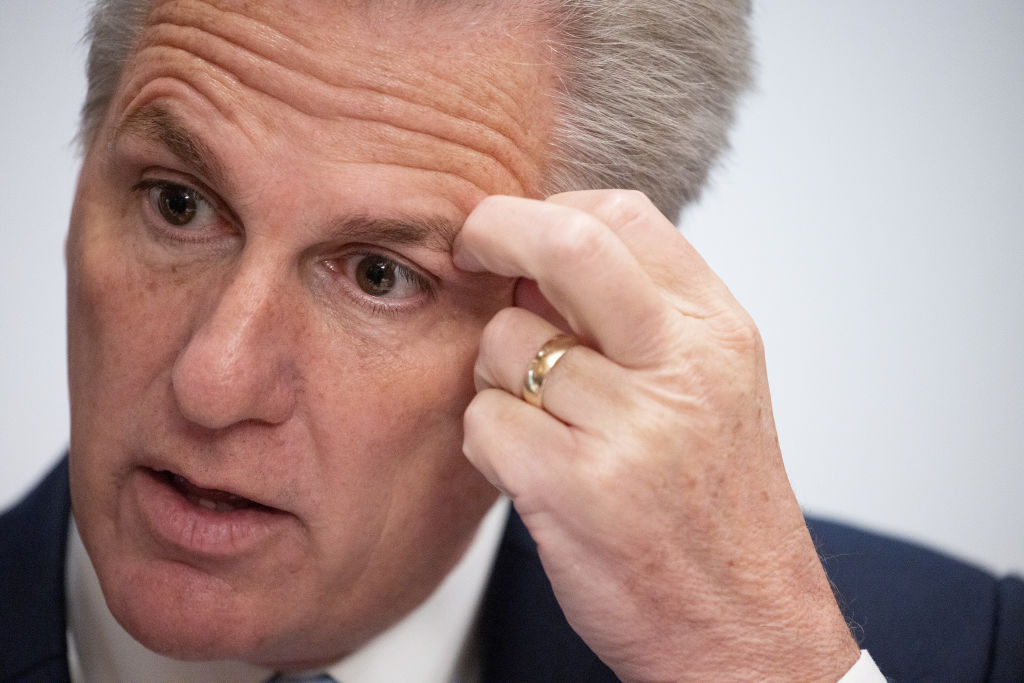Kevin McCarthy’s mouth does two things: it kisses Donald Trump’s hand and it emits denouncements of his constituents.
After Rep. Marjorie Taylor Greene recently likened what she considers COVID-19-based discrimination to the treatment of Jews during the Holocaust, the House minority leader swooped down bearing talons of condemnation. ‘Marjorie is wrong, and her intentional decision to compare the horrors of the Holocaust with wearing masks is appalling,’ he wrote. ‘Let me be clear: the House Republican Conference condemns this language.’
Whatever you might think of Greene’s comments, it’s hard to imagine a Democrat as eager as McCarthy to smite one of his own. Moreover, Greene’s remarks, boomerish though they may be, reflect the frustrations many Americans feel about the emerging two-tier post-pandemic society. But these are provincial concerns for McCarthy, who seems to resent the provinces above all.
In an interview with Fox News last August, he declared, ‘there’s no place for QAnon in the Republican party’. McCarthy had honed in on the real problem — after months of destructive and deadly rioting fueled by leftist agitators.
Ironically, that denunciatory statement was probably the first instance many Republicans had even heard of the fringe movement. By that time, the demographic with the most knowledge of QAnon were wealthy, educated Democrats fed a paranoiac’s diet of cable news.
Why does McCarthy seem more attuned to the fear and loathing of Democrats than to his Republican constituency? Enter repugnant GOP pollster Frank Luntz.
It’s hard to think of an individual more anathematic than Luntz, whose primary function is to create as much distance between what Republican voters want and what GOP lawmakers do. He bragged in 1993, ‘I act like a Democrat.’ Indeed, he said, ‘I don’t act like a conservative in my dress or the way I speak. I’m shy, but I’m not stodgy. I don’t have the half-a-million-dollar beach house, even though I could.’
He may or may not have a beach house, but it recently came to light that McCarthy rented a room in Luntz’s sprawling District of Columbia condo.
Sure, it’s shameful and possibly a violation of House ethics rules, but McCarthy told the press he doesn’t see how the long slumber party at the 7,000-square-foot, 12-bedroom, 16-bathroom penthouse is controversial. ‘Frank [Luntz] has been a friend of mine for more than 30 years,’ he said — which is at least as long as Luntz has been working with Democrats while being paid by Republicans.
Journalist Zachary Petrizzo took a deep dive into Luntz’s company, FIL, Inc., which received $40,000 for polling in late 2020 from McCarthy’s Majority Committee PAC — around the time McCarthy got comfortable in Luntz’s place. Petrizzo discovered a team of mostly Democrats in FIL’s employ.
‘Luntz hired Daniel Siegel in August of 2018 directly from the campaign operations team of Katie Porter,’ writes Petrizzo, ‘then a House candidate in California and now a Democratic member of Congress.’ According to Petrizzo, Siegel was ‘presumably instrumental’ in Porter defeating then-incumbent Republican representative Mimi Walters and flipping California’s 45th Congressional District from Republican to Democratic control. Walters was one of McCarthy’s ‘Young Gun’ bright lights. ‘McCarthy’s PAC, the Congressional Leadership Fund…pumped more than $3 million into backing Walters’.
Luntz’s social media manager and content creator, Hetal Bhatt, has a record of anti-Trump, pro-Black Lives Matter public postings. His FIL chief of staff, Alexis Vickers, formerly served as director of scheduling for the Democratic conference leader in the New York State Senate during 2009 and 2010. Another Italian-born employee named Andrea Arletti with murky connections lives in the UAE.
McCarthy, in other words, has a history of paying Luntz to help Democrats with money given to him by Republican voters, which is just one reason he has become a bête noire of the base. But the House Minority Leader recently experienced a little public relations rehabilitation thanks to Trump.
In January, Trump made McCarthy point man in his fight to supposedly outflank Democrats and electorally challenge the GOP establishment in 2022. With that pat on the back from Trump, McCarthy turned around and prevented Wyoming represenative Liz Cheney from being removed by her colleagues as Republican conference chair for voting to impeach the former president. McCarthy ‘offered a full-throated defense of Cheney and made the case for her to stay in leadership’, Politico reported. Cheney did not return the kindness.
‘I don’t believe that [Trump] should be playing a role in the future of the party or the country,’ she told reporters while standing right behind McCarthy, publicly humiliating Kevin. She did it again when Cheney bucked McCarthy’s proposal over an independent commission into January 6. He reportedly shares Cheney’s misgivings about that event and the Trump supporters involved — he’s just more discrete.
McCarthy has since led the effort to exorcise Cheney from the GOP. In her stead, Paul Ryan apprentice Rep. Elise Stefanik, a New York Republican, stepped up, thus perpetuating the cycle of the Stupid party.
The Arab philosopher Ibn Khaldun theorized that social solidarity thrives in nomadic tribes but decays once warlords settle down and flower their clans into civilizations. He used this model to explain the cyclical conquest of cities, wherein decadence enervated leaders and citizens. If Middle Americans want real, meaningful change, they’ll have to become warlords against their own party and leaders, which, as McCarthy shows, seem above all devoted to their enemies.


















